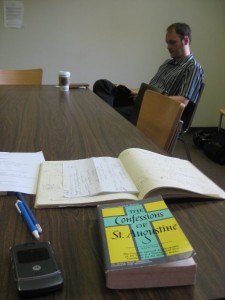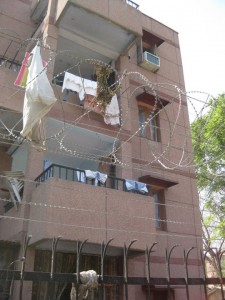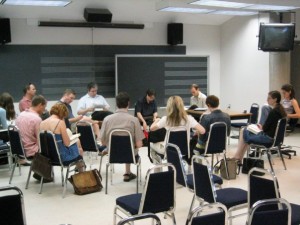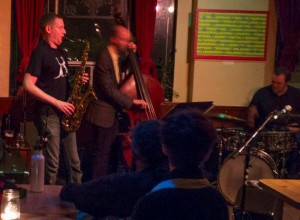 When Augustine came to Rome from his home in North Africa just before 400 A.D., he was coming to the cultural centre of that part of the world, rather as one trying to “make it” might travel now from a small mid-western town to New York City. But whereas New York has been a major city only for about 150 years (initially beginning to prosper through offering a regular naval cargo service operating back and forth to England), Rome had been a cultural capitol for centuries. In 410, though, Rome was sacked by the Goths, and, though that particular event may not be of tremendous significance by itself, it is emblematic of the dramatic change that took place around this time. Not only did the city of Rome fall prey to alien invaders: the whole Mediterranean and European cultural world of which it had been the centre for centuries was about to come to an end, to be replaced by an era not inappropriately called “the Dark Ages.”
When Augustine came to Rome from his home in North Africa just before 400 A.D., he was coming to the cultural centre of that part of the world, rather as one trying to “make it” might travel now from a small mid-western town to New York City. But whereas New York has been a major city only for about 150 years (initially beginning to prosper through offering a regular naval cargo service operating back and forth to England), Rome had been a cultural capitol for centuries. In 410, though, Rome was sacked by the Goths, and, though that particular event may not be of tremendous significance by itself, it is emblematic of the dramatic change that took place around this time. Not only did the city of Rome fall prey to alien invaders: the whole Mediterranean and European cultural world of which it had been the centre for centuries was about to come to an end, to be replaced by an era not inappropriately called “the Dark Ages.”
I find it fascinating to reflect on the different perception one would have had in Rome in, say, 400, and the perception one would have had in, say, 450. While there were obvious signs of trouble by 400, I imagine that people generally did not imagine their whole world and all its familiar terms and structures were about to disappear; by 450, I imagine the millenium-long glory of Greco-Roman Mediterranean culture seemed the matter for a nostalgic dream.
 I tend to think that we are living in Rome in 400. In other words, I think we are living in a world that is soon to undergo a pretty dramatic change. Our modern North American culture (and the broader culture of European modernity that is its context) was built up through generations of creative work, and, through both fair means and foul, this modern life was accomplished. Our modern generation, though, has mostly lived on the fruits of these accomplishments–not so much accomplishments in technology, which are obviously of central importance, but more importantly accomplishments in the development of social infrastructure such as sewage systems and roadways, accomplishments in political participation for historically marginalized groups, developments in intercultural communication and interaction, and so on–without particularly advancing or even protecting these accomplishments. Instead, the richness of our accomplished culture has been a great storehouse to be plundered by wily politicians, bankers and the like for many decades, while the broader population carries on its life largely oblivious to what is happening, content to live on the basis of the progressively attenuated form of the accomplishments of earlier generations. I fear that not long from now this world will look different in a way most of us, presuming without question the general continuation of the familiar, have not anticipated or prepared for.
I tend to think that we are living in Rome in 400. In other words, I think we are living in a world that is soon to undergo a pretty dramatic change. Our modern North American culture (and the broader culture of European modernity that is its context) was built up through generations of creative work, and, through both fair means and foul, this modern life was accomplished. Our modern generation, though, has mostly lived on the fruits of these accomplishments–not so much accomplishments in technology, which are obviously of central importance, but more importantly accomplishments in the development of social infrastructure such as sewage systems and roadways, accomplishments in political participation for historically marginalized groups, developments in intercultural communication and interaction, and so on–without particularly advancing or even protecting these accomplishments. Instead, the richness of our accomplished culture has been a great storehouse to be plundered by wily politicians, bankers and the like for many decades, while the broader population carries on its life largely oblivious to what is happening, content to live on the basis of the progressively attenuated form of the accomplishments of earlier generations. I fear that not long from now this world will look different in a way most of us, presuming without question the general continuation of the familiar, have not anticipated or prepared for.
Those who do look at the contemporary political world and there see impending political, economic and environmental disaster are typically disheartened and immobilized: it’s often hard to do much other than look on in disbelief at what is happening, (while nonetheless believing very much in the reality of what’s happening).
I think it is important in such situations for concerned individuals to remember that this was the age into which we were born. The forces that have brought us to this point were not of our making, and none of us has the individual power to change this contemporary state of things. We, as individuals, are not players at the global level and we should not, therefore, measure our individual agency by its ability to have an impact at that level. While it is easy (and no doubt proper!) to bemoan the state of the world–while it is important, in other words, not to be indifferent to global issues–it is, I think, essential to turn our energies to affairs that are of a size appropriate to the agency of individuals, and to concern ourselves with handling these affairs well.
 Teachers typically do not have the power to reduce the sizes of the classes that they are required, by the economic and organizational decisions of governments and educational administrators, to teach. While it is right to complain about the bad educational policies that produce such large classes and to contribute what one can to collective action aimed at pressuring administrators to improve things, (frustrating experiences in which we commonly discover more impotence than power), we should nonetheless complement these activities with the positive practice of doing what we can to offer the most we can to the students who have no other avenue to education than this, and we should recognize that, in so doing, we are offering an essential human service that will come from nowhere else if not from us.
Teachers typically do not have the power to reduce the sizes of the classes that they are required, by the economic and organizational decisions of governments and educational administrators, to teach. While it is right to complain about the bad educational policies that produce such large classes and to contribute what one can to collective action aimed at pressuring administrators to improve things, (frustrating experiences in which we commonly discover more impotence than power), we should nonetheless complement these activities with the positive practice of doing what we can to offer the most we can to the students who have no other avenue to education than this, and we should recognize that, in so doing, we are offering an essential human service that will come from nowhere else if not from us.
 Writers, musicians and other artists face a commercial and a political world that is systematically minimizing the cultural impact of the arts (and, coincidentally, crippling the capacity of artist’s to sustain themselves). But, in the absence of the ability to have a large-scale impact, (which is the glittering dream by which contemporary advertising tantalizes us all), we should not conclude that art is no longer relevant, but should instead contribute to the spiritual health of the smaller communities to which we belong, and we should appreciate the irreplaceable importance of this contribution.
Writers, musicians and other artists face a commercial and a political world that is systematically minimizing the cultural impact of the arts (and, coincidentally, crippling the capacity of artist’s to sustain themselves). But, in the absence of the ability to have a large-scale impact, (which is the glittering dream by which contemporary advertising tantalizes us all), we should not conclude that art is no longer relevant, but should instead contribute to the spiritual health of the smaller communities to which we belong, and we should appreciate the irreplaceable importance of this contribution.
We should care about matters of global justice, and do what is within our power to understand these issues and to support constructive efforts, but we should also remember to focus on the local matters of justice that arise in our families, our workplaces and our other local communities. Whereas in the first domain we can typically expect to meet with failure and frustration, there is good reason to think we can meet with much success in our local settings, which is much to the advantage of the quality of the lives of all the individual persons involved.
Today is New Year’s Day, and there is a tradition in my culture of making a resolution on this day for one’s conduct in the upcoming year. This year, why not resolve to contribute what you can to your local worlds, despite the gloom that characterizes our global situation?


 Participants in these
seminars consistently have the experience of growth in their conversation and
conceptual abilities, and typically leave with a transformed sense of the nature
and possibilities of philosophy.
Participants in these
seminars consistently have the experience of growth in their conversation and
conceptual abilities, and typically leave with a transformed sense of the nature
and possibilities of philosophy.





3 Comments
Your description of how we are often unaware of the accomplishments that make our present lives possible reminds me of Simone de Beauvoir’s discussion of the adventurer in the Ethics of Ambiguity. The adventurer is a person who lives a life pursuing what excites and interests her; as such, the adventure might seem to be the embodiment of freedom. Yet the adventurer’s ability to engage in these pursuits is not entirely of her own making. Her ability to engage in these pursuits depends on other people, both on a personal level and on an institutional and political level. In so far as she is unaware of how indebted she is to others for her life, her freedom is not yet fully realized. She must come to recognize, and take responsibility for, these relations with others upon which she depends. Your discussion of the impact that we can have on our local worlds helped me to see what a more adequate realization of our freedom, a realization that overcame some of the problems of the adventurer, might look like.
Reading your post, I was very strongly reminded of the final paragraph of Alasdair MacIntyre’s After Virtue, where he draws the parallel between our times and the decline of the Roman Empire and the ensuing Dark Ages and reaches a conclusion similar to yours: “What matters at this stage is the construction of local forms of community within which civility and the intellectual and moral life can be sustained through the new dark ages which are already upon us.” (Second edition, University of Notre Dame Press, 1984, p. 263). You give here a compelling case for such constructions (in my case, a continually renewed commitment to my classes). But I also like the notion of conceiving different “agencies of scale.” It allows for intermediate agencies between the global and local (or different kinds of “local”) embodied, for example, in the articulation of different political platforms for political parties to debate and, if in positions of legislative influence, to propose and to fight for passage, whether at the municipal/regional, provincial, or federal levels. Legislation itself as a kind of “agency of scale.”
Thanks for the reference to MacIntyre. That’s very helpful, and I will draw on that in the future.